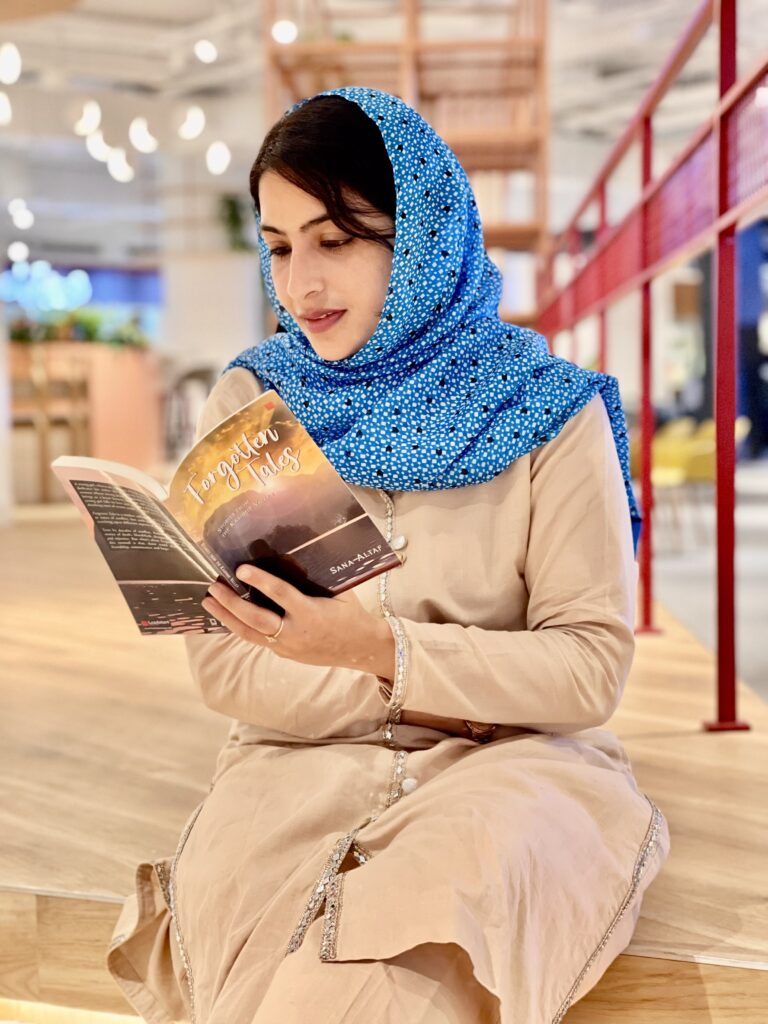Set against the backdrop of the conflict-ridden Kashmir of the nineties, Sana Altaf’s collection of short stories was released on July 24. She is a Kashmiri journalist based out of Dubai. In this interview with Kashmir Newsline, she talks about her book and what inspired her to write it.
What inspired you to write Forgotten Tales: Stories from the Kashmir Valley?
Forgotten Tales is a collection of short stories set in Kashmir against the backdrop of a conflict. My inspiration is my childhood and the people of Kashmir.
If you could, please, elaborate.
I was 5 when the armed uprising started in Kashmir. I have memories of crackdowns, search operations, grenade blasts, shootouts and all that. There was a firefight outside my house. We lived in the Karan Nagar neighbourhood of Civil Lines in Srinagar. I was brought up there. I have memories of a man who was hit in his eye by a bullet and it was literally gouged. He was caught in cross-firing between forces and militants in an inner lane when a bullet hit him.
He came to our house, knocking at our door. Then he climbed over the wall. We had an ophthalmologist neighbor. Dad took him there.
What other childhood memories do you have?
As children, we used to play games that had militants and security forces as the characters. That is the effect a raging conflict can have on children’s psyche and mental makeup. I also remember my father was abducted several times by militants for ransom. They wanted money. At times my dad and uncles were also picked. On a few occasions, they were told to join militant ranks. Two of my cousins were abducted–later released–on the mehndi raat of another cousin. As children of conflict, these memories keep haunting always.
You seem to have a photographic memory of it.
I do. I remember touching a pistol when I was 6 and it was so exciting as a child. There was a distant cousin who was a militant and he and his associates had come to stay at our house for a day as there were searches and crackdowns going on and they needed refuge. I remember we stayed awake the whole night – both out of fear and fascination. There was always an apprehension that the forces might come and an encounter would follow which often ended in civilian casualties as well. I vividly remember the face of one of the militants in the group. He was extremely handsome. He sat me on his lap and let me touch his pistol. When we woke up in excitement in the morning, they were gone.
How did the conflict affect your education amid frequent hartals and other disruptions?
To be honest with you, as kids, we’d be happy whenever there was a hartal – a civil curfew – or curfew and hartals and government-imposed curfews were quite frequent those days. For us bunch of cousins, it always meant a huge family get-together. We were a large family and all would stay indoors which we, the kids, loved, totally oblivious to how it affected our education and business as well. But, as I said earlier, there was always a sense of fear lurking in the mind. Whenever we would go out to play in the lanes and bylanes, there was always a fear of a stray bullet or cross firing or any other untoward incident.
You’re a journalist. Is this a coincidence or did you choose to become one?
If you have a look at my slambook from grade IX in school – I still have it with me – it’s clearly written there that ‘I want to be a journalist’.
What inspired you to choose journalism as your career?
I think my strong urge to tell stories guided me to it. I always wanted to narrate how and what I felt and experienced. I have always been a keen, sensitive observer. As a child, I would sit aloof and keep contemplating about what unfolded before me. I would ask myself questions.
After becoming a journalist, when did it occur to you that you had to write a book?
Leaving Kashmir was a different experience for me. When I reported from there, I would meet people, talk to them. I would write about their pain. It was a great release and gave me relief. And I felt content there was something I was doing for the people. It was around 2017 when I was already in Dubai that I decided to do a book. It was lingering on in my mind for a long time. I was disturbed that I wasn’t able to write about Kashmir and fellow Kashmiris. This anthology of stories is very close to my heart. Each of the stories is an experience that I have lived and seen others around me live. It is those people that translate into the characters in my stories. I had to share these stories, irrespective of how well the book does or whether or not I earn anything from it. There is, of course, a lot more within me that I want to put in black and white. I don’t know when that is going to happen. As of now, I’m elated the book saw the light of the day.
So you’ve unburdened yourself of pain and trauma and the duty you felt towards fellow Kashmiris.
You can say that. I’ve tried to do so. Now it is for the readers to decide if I’ve succeeded. I see a great response already. People who I don’t know at all and those from different parts of the world have shown such warmth and it’s so humbling as an author to see all that.
Why or how do you think stories are able to create that kind of reaction in people where they touch something viscerally inside of us that relates to our own past?
I believe we all are nothing but a bundle of stories. And all of us have stories that somewhere connect to people around us. When we tell our stories, there is always something in there that touches a chord with the readers and creates an impact.
Is there something in your depiction of Kashmir Valley, other than the way of writing and storytelling itself, that gets to people in some universal way? Do you think you have hit upon something that’s ubiquitous to small towns or the shadows of small towns, something that people can feel in their own communities in isolated parts of whatever city they may be from?
The book is about struggle, pain and injustice. And I won’t say that it exists only in Kashmir. It’s the truth in many cities, towns, and countries in the world. That’s why it’s important to tell such stories so people pause and think for a moment, so that our future generation knows the past in a factual way. Telling stories is the only way to preserve the present, and it’s the present that creates history one day.
In your stories, while none of your characters could be considered hero in the traditional mould, there is something heroic in their unflinching courage. They are frustrated and longing for something more, but they’re not, for the most part, losing hope. Was it a conscious decision to make courage the virtue that sustains them through what could be deemed a purgatorial existence, or did you see it more as a shackle that prevents them from escaping this world, this stagnant way of living?
I believe heroes are not just those who make incredible achievements in life while the world cheers them. Heroes are also those who stand against the blunt reality of life and in Kashmir, you see such heroes everywhere. There is a hero in every single Kashmiri who has lived through the reality of the past thirty years and that’s the reality I have tried to depict in my book
How do you get such a fine level of detail about your characters, their thought processes and their lives?
By nature, I love to observe people, interact with them, and know their stories. Besides, when I worked as a journalist in Kashmir, it gave me a closer look into peoples’ lives, their thoughts, and sufferings.
What kind of situation for a character do you find yourself searching for when you start a new story? What most frequently gives you a way in?
Realistic situations. To me, they are the most appealing.
Did you have any goals for this collection when you wrote it? Any particular theme you wanted to explore?
The stories I have penned are an expression of my heart. They are the stories I wanted to tell. I never had any specific theme to follow.
What do you hope readers will get out of your book?
The book gives an insight into the lives of the people of Kashmir which need not be forgotten.
Is there anything you are currently working on that may intrigue the interest of your readers?
Nothing concrete so far, but will surely come up with another book – that’s for sure.
Your book has started getting a reasonable amount of publicity on social media and it seems the sales have started picking. How does it feel?
It definitely feels good, more so when I see the readers getting to understand the message I have tried to convey.
And what’s that massage? If you could, please, elaborate.
That what meets the eye is not always right. Sometimes there are deeper stories behind the scenes we are exposed to
Could you explain that?
What most people know about Kashmir is that it’s a beautiful place which is at the center of a dispute between India and Pakistan. But what ground reality holds is entirely different. And that’s what I have tried to capture.
Did some of the readers get in touch with you and give you their opinion about Forgotten Tales?
Yes, many. They are glad that now there is a book that gives a glimpse of the lives of people in Kashmir more closely.
It is a slim book. Don’t you think you could’ve added a few more stories to the collection? This book can be finished cover to cover in a couple of hours.
I believe the size of the book doesn’t matter much. What matters is what story you are telling and what importance it holds. Besides, I wanted this book to be read by even those who never read books.
Any message for young journos and aspiring writers?
Yes! There are too many stories that need to be told and I think we need to stand up to the oppression against journalists. Journalists and writers in Kashmir have to figure a way out to ensure that the stories don’t get lost. We need to tell many more stories. There are so many of them from Kashmir. If our stories are lost, our history is lost. No nation can afford that.


